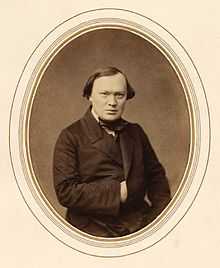Talents and Admirers
| Talents and Admirers | |
|---|---|
| Written by | Aleksandr Ostrovsky |
| Date premiered | 20 December 1881 |
| Place premiered | Maly Theatre in Moscow |
| Original language | Russian |
| Subject | Young actress' tribulation on and behind the late 19th century Russian theatre stage |
| Genre | Comedy |
Talents and Admirers (Talanty y poklonniki, Russian: Таланты и поклонники) is a play by Alexander Ostrovsky premiered on December 20, 1881, in Maly Theatre. The author started working upon this 4-act comedy in August 1881 and finished it on December 6 of the same year.[1]
Background
Ostrovsky was writing his play in those days he was working in the 1881 Theatre reform commission he was invited as a member of. Negina's dilemma, according to the biographer Vladimir Lakshin, has been too well known to Ostrovsky himself. He often had to go to rich men for help but considered such compromises necessary and he had to "bear his cross" in the interest of theater that he was devoted to.[1] According to the author, "the art cannot defend itself facing rough brutal force and has had to find rich mentors". "When cruelty and cynicism rule, poetry folds its winds and meekly departs," he wrote in one of the rough versions of the comedy called "The Dreamers".[2] The original title of the comedy was Open Letters. According to the actor I.A.Shlyapkin, it has been read in the circle of the author’s brother Mikhail Ostrovsky’s friends and was received coldly. Alexander Ostrovsky was so distraught with that as to fall ill.[3]
Productions
Talents and Admirers was premiered on December 20, 1881, in Maly Theatre as the actor’s Nikolai Muzilh’s benefice (he played Narokov). Negina was performed by M.N.Ermolova, Domna Panteleevna by O.O.Sadovskaya, Meluzov by M.P.Sadovsky, Velikatov by A.P.Lensky. Latter Maly Theatre’s productions (1885, 1895, 1900, 1902, 1912) featured among others C.V.Aidarov and A.A.Fedotob (Dulebov), A.I.Yuzhin (Bakin), K.N.Rybakov, M.M.Klimov (Velikatov), P.M.Sadovsky and I.A.Ryzhov (Meluzov).[2]
In 1882 the play was staged by Alexandrinsky Theatre as the actress Maria Savina benefice (Negina). The production also featured V.V.Strelskaya (Domna Panteleevna), Nilsky (Dulebov), Petipa (Bakin), Kiselevsky (Velikatov), Gorev (Meluzov), Abarinova (Smelskaya), Davydov (Narokov). Later productions featured performances by such actors as Yu.V.Korvin-Kryukovsky (Bakin), R.B.Apollonsky, V.P.Dalmatov (Velikatov), N.N.Khodotov (Meluzov).[2]
Characters
- Alexandra Negina, young actress in a provincial theatre
- Domna Panteleevna, her mother, a widow, a 'simple woman' in her 40s
- Prince Irakly Dulebov, an 'old guard' kind of aristocrat, an old man
- Grigory Bakin, a man of 30, regional government's official
- Ivan Velikatov, a very rich landowner, owner of several estates and factories. A practical man of modest ways and good manners.
- Pyotr Meluzov, a young man, who, after just one year in University, awaits for getting a teacher's vacancy
- Nina Smelskaya, an actress, who is older than Negina[4]
Synopsis
Negina, a popular but poor actress, is being taught sciences and high moral principles by her fiancée Meluzov. Prince Dulebov, intending to take advantage of the girl's dire circumstances to his advantage, suggest sponsorship. The actress refuses Dulebov in sharp terms, making an old man spiteful and revengeful. Despite the latter's intrigues, Negina's benefice performance is triumphant, she receives large sum of money, part of which Dulebov himself has to provide to keep his face. Still, the entrepreneur refuses to prolong her contract. One after another ecstatic admires come to her to express their affection. Narokov, Naluzov and Velikatov confess they were in love with her. After some reflections she leaves honest but dull Meluzov and goes away with rich Velikatov, her motive being not money but the ability to work on stage, the only thing she’s really in love with.[5]
References
- ↑ 1.0 1.1 Lakshin, Vladimir (1982). "Alexander Nikolayevich Ostrovsky". Iskusstvo Publishers, Moscow. Life in Art series. Retrieved 2012-03-01.
- ↑ 2.0 2.1 2.2 The Complete A.N. Ostrovsky in 12 Volumes. Moscow. Iskusstvo Publishers. 1973-1980. Vol. 5, p. 519.
- ↑ Russkaya literature, 1960, #1, p. 154.
- ↑ "Talents and Admirers". az.lib.ru. Retrieved 2012-03-01.
- ↑ Lakshin, Vladimir. A.N.Ostrovsky. Selected plays. Khudozhestvennaya Literatura. Preface by… Moscow, 1970, pp 3-38
| ||||||||
